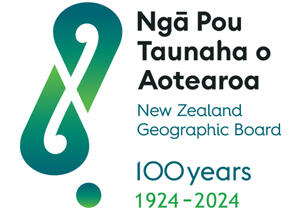The role of the New Zealand Geographic Board in Treaty settlements
We consider place names that claimant groups propose through Te Tari Whakatau (The Office of Treaty Settlements and Takutai Moana), who negotiate Treaty settlements on behalf of the Crown. We make sure that all proposed place names meet our naming standards, policies and guidelines, and then we make recommendations to Te Tari Whakatau for the Minister for Treaty of Waitangi Negotiations. The Minister makes the final decisions on place names included in a Treaty settlement.
The public aren’t consulted on Treaty settlement name proposals. The reason for including place names in a Treaty settlement is to restore or correct them and officially recognise a claimant group’s significant connection to a place.
Once official a Treaty settlement place name can only be changed with written consent from the trustees of the relevant Treaty settlement group.
Place names that can be included in settlements
Any original Māori name for a geographic feature or place within a claimant’s agreed area of interest can be included in a Treaty settlement. Place names can be restored and corrected, and made official or collected as unofficial place names to recognise their importance. Overlapping and neighbouring iwi will be consulted for their views on all proposed Treaty place names.
All place names included in a Treaty settlement are published in the New Zealand Gazetteer, along with their histories, so they can be easily found by the general public.
The types of features and places included in Treaty settlements include: a mountain, island, valley, river, bay, lake, historic site, area or place. However, to officially change the name of a populated place (town, city, suburb or locality) a full proposal needs to be made outside of the Treaty process, which includes public consultation. Original Māori place names made official outside of the Treaty process could then be included in a settlement for protection from future change.
If you are a member of a Treaty claimant group and interested in place names redress, please contact Te Tari Whakatau.
